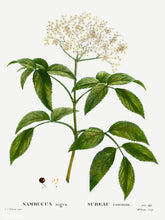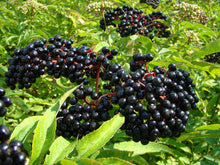Ukrainian Black Elderberry
Regular price
$4.00
Sale
Sambucus nigra
Origin: Ukraine
Improvement status: Unknown
Seeds per packet: ~150
BOTANICAL SAMPLE - NOT GERMINATION TESTED
Life cycle: Perennial
We are very excited to be offering these special black elderberry seeds imported from Ukraine. Unlike American elders (which are likewise called black elderberries and are considered the same species botanically though they have a more shrubby growth habit than their tree-like counterparts in Eurasia), European elders are sought after as much for their fragrant and flavorful flowers as for their fruit. The classic elderflower cordial syrup can only be made with European elder — for some reason the American plants simply don't work. You can make a syrup from them, sure, but the mild flavor they yield is all wrong. We only just got this batch of seeds from the experienced importers at Sheffield's Seeds in western New York, so we haven't grown any yet, but we're sure that their Ukrainian provenance means they will have all of that classic elderflower flavor.
There is not a lot of elderberry diversity available in the nursery trade these days (and there is even less of European varieties), which means the growing elderberry industry is potentially susceptible to emerging pests and diseases. Since elderberries produce very little unless grown in the presence of another variety (and one that blooms at the same time), it is important to grow at least two or three or four different varieties to maximize production. European and American elders can serve as pollinators for each other.
Each of the seeds in each packet we sell will produce a unique elderberry plant. Given how little breeding work is being done, you very well could grow the next important European elderberry cultivar (or, if you have American elderberries around, the next important hybrid cultivar!).
These seeds were imported from Ukraine before the 2022 Russian invasion. Your purchase of them helps support our ex-situ conservation work with Ukrainian crop diversity (begun in earnest before the war due to EFN co-founder Nate Kleinman's Ukrainian heritage). We hope to be able to return many traditional Ukrainian varieties to growers in the country during a time of peace.
GROWING TIPS: We recommend a long pre-treatment process for elderberry seeds (though if you plant all with no treatment a few are likely to sprout anyway). First douse seeds in hot tap water and then let stand in that water for 24 hours. Then add seeds to moist sand or soil or other growing medium and stratify at room temperature for 60 days, then in the refrigerator for 120-150 days. Sow seed 1/4'' deep. You could also try planting them outside in the fall or winter to allow nature to stratify them for you. Seedlings should be coddled for their first year or two, after which they will be just as vigorous as any other elderberry, and will be easy to propagate by cuttings.
NOTE: Given the challenges involved in germinating elderberries and in an effort to get you the freshest seed possible, we are offering these seeds as untested botanical samples. They were harvested in 2021.
Fruit photo credit: Edal Anton Lefterov, licensed under the Creative Commons Attribution-Share Alike 3.0 Unported license.
Illustration image: Downloaded from rawpixel.com under a CC by 2.0 license.




